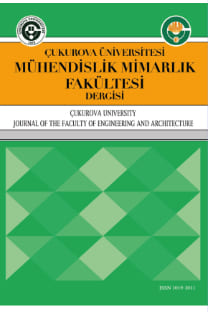Yüklenici Firmaların Tedarik Zinciri Yönetimi Uygulamalarında Kritik Başarı Faktörleri
Critical Success Factors for Successful Supply Chain Management Applications of Construction Firms
___
- 1. O'brien, M.J., Fischer, M.A., Jucker, J.V., 1995. An Economic View on Project Co-ordination. Construction Management and Economics 13 (5), 393-400.
- 2. Winch, G.M. 1989. The Construction Firm and the Construction Project: A Transaction Cost Approach. Construction Management & Economics, Vol.7, pp. 331-345.
- 3. Oral. L, E., Kurt, D., 2000. Tam Zamanında Satınalma Sisteminin İnşaat Malzeme Yönetimine Uygulanabilirliği; 2.Yapı İşletmesi Kongresi Bildiriler Kitabı, İzmir Baş saray Basımevi, 15-17 Haziran 2000.
- 4. Kekre, S., Murthi, B.P.S., Srinivasan, K. 1995. Operating Decisions, Supplier Availability and Quality: An Empirical Study. Journal of Operations Management 12, Pp. 387-396.
- 5. Lummus, R., Vokurka, R. J., 1999. Defining Supply Chain Management: A Historical Perspective and Practical Guidelines. Industrial Management & Data Systems 99/1, 1117.
- 6. Egan, J., 1998. Rethinking Construction: The Report of the Construction Task Force. London, Department of the Environment, Transport and the Regions.
- 7. Vrijhoef, R., Koskela, L., 2000. The Four Roles of Supply Chain Management in Construction. European Journal of Purchasing & Supply Management, 6, 169-178.
- 8. Choi, T, Y., Hartly, J, L., 1996. An Exploration of Supplier Selection Practices Across the Supply Chain. Journal of Operations Management 14, P. 333-343.
- 9. Akintoye, A, Mcintosh, G., Fitzgerald, F., 2000. A Survey of Supply Chain Collaboration and Management in the UK Construction Industry, European Journal of Purchasing & Supply Management 6, 159-168.
- 10. Lambert, D. M., Cooper, M.C., Pagh, J.D., 1998. Supply Chain Management: İmplementation Issues and Research Opportunities. International Journal of Logistics Management, Vol. 9, No. 2, 1-18.
- 11. Wong, A., Fung, P., 1999. TQM in the Construction Industry in Hong Kong: A Supply Chain Management Perspective. Total Quality Management 10 (2), 199208.
- 12. Dale, B.G., Lascelles, D.M., Lloyd, A., 1994. Supply Chain Management and Development. Managing Quality. Prentice-Hall, London, pp. 292315.
- 13. Bayram, N., 2004. Sosyal Bilimlerde SPSS ile Veri Analizi. 1. Baskı, 4 Nokta Matbaacılık, Bursa.
- 14. Tan, K. C.A., 2001. Framework of Supply Chain Management Literature, European Journal of Purchasing and Supply Management, vol. 7, No. 1, s. 39-48.
- 15. Swink, M. 2006. Building Collaborative Innovation Capability, Research-Technology Management, March-April, 37-47.
- ISSN: 1019-1011
- Yayın Aralığı: Yılda 4 Sayı
- Başlangıç: 1986
- Yayıncı: ÇUKUROVA ÜNİVERSİTESİ MÜHENDİSLİK FAKÜLTESİ
Yüklenici Firmaların Tedarik Zinciri Yönetimi Uygulamalarında Kritik Başarı Faktörleri
ebrahim SALAMI, Emel KAPTALI ORAL, SERKAN AYDINLI
Çöktürülmüş Kalsiyum Karbonat Üretimi
ERTAÇ HÜRDOĞAN, KAMİL NEYFEL ÇERÇİ, Muhammed Murat AKSOY
Efficiency Analysis of an Installed Wind Farm
Akın İLHAN, MEHMET BİLGİLİ, BEŞİR ŞAHİN
ATIK DEMİR TOZU KATKILI HARÇ VE BETONLARIN DURABİLİTE ÖZELLİKLERİ
HANİFİ BİNİCİ, AHMET HAYRULLAH SEVİNÇ, Hanifi GEÇKİL
An Artificial Bee Colony Based Algorithm for Feature Selection
EZGİ ZORARPACI, SELMA AYŞE ÖZEL, Süleyman GÜNGÖR
Dalgaboyu Bölümlemeli Çoğullama (DBÇ) Üzerinde Optik ÇoğuĢma Anahtarlama (OÇA) ve Çoğa Gönderim
Balık Kılçığı Yöntemi ile Mobil Vinç Kazası Olası Nedenlerinin Ġncelenmesi
Kömür Damarlarının Gaz Ġçeriğinin Belirlenmesi; Örnek Bir Uygulama
Sağlık Ocaklarında Konfor KoĢullarının Değerlendirilmesi: Bursa/Nilüfer Örneği
